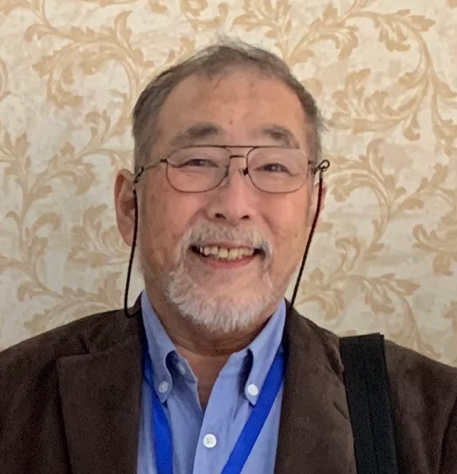訃報
原文(英語)

Dr. Motokazu Ando
27th March 1950 – 24th March 2020
Dr. Ando was born in Osaka on March 27, 1950, and passed away from pancreatic cancer on March 24, 2020 at the age of 69.
After graduating from the Department of Science, College of Liberal Arts, International Christian University in 1973, he joined Hani Productions and was involved in filming wildlife movies in Africa, etc. After that, he became a temporary staffer at the Zoology laboratory of Professor Hideo Obara in the Women’s Nutrition University. His otter life might be said to have started with joining the survey of Japanese otters by Yoshiharu Imaizumi in Kochi Prefecture from 1972 to 1976. In 1978, he entered the Graduate School of Agriculture, Kyushu University, to study wildlife. In 1982, he became a lecturer at the Department of Biology at Gyeongnam University in South Korea while he was a graduate student, and started otter research in South Korea, which until then had hardly been studied. After obtaining his Ph.D. in 1985 for research on arboreal and gliding adaptation of the giant flying squirrel (Petaurista leucogenys), he started to work as an officer of Shiga Prefecture. In 1993 he joined the staff of the International Lake Environment Committee Secretariat for the conservation of wetlands and later was a consultant for global wetland conservation. In 2001, he got a job at Tokyo University of Agriculture, where he studied the ecology of many mammals including otters, with many students. He retired in 2015, moved to Yamazaki Gakuen University, retired again in 2018, and became an emeritus professor at Yamazaki Animal Nursing University.
In 1989, I was asked by the government to study the present situation of otters in Kochi Prefecture, but I had never done an otter survey. I asked Dr. Ando to teach me how he studies otters in Korea. Dr. Ando and I established the Otter Research Group, and had carried out much research and awareness-raising activities for otters in various parts of Asia, such as the Korea-Japan Otter Symposium in Japan and South Korea in 1995, IUCN OSG Asia Group meeting in Thailand in 1996, Workshop on surveying and monitoring otter populations in Thailand in 1997, Workshop on conservation and public awareness of otters in Taiwan in 1999, Workshop on otter conservation in Toa Daeng Peat Swamp Forest in 2000, the Pan-Asian otter workshop in India in 2002, andWorkshop on Enhancement of Knowledge and conservation otters in U Minh Thuong National Park in Vietnam in 2002. We published The Wetlands Ambassador-Education and Public Awareness methodologies for otter conservation in English in 2001 and in Korean in 2002. During this time, he also joined the OSG..
For wetland conservation, he has been the Chairperson of Japan at Ramsar Center from 2006 to 2018, and was also active as Vice Chairman of the Japan Wetland Society from 2013 to 2018. He has been active as a board member of the Wildlife Conservation Research Group since 2006, has taken the leadership as a chairperson from 2013 until his death, and also as a member of this group delegation for the CITES meeting.
Dr. Sung-yong Han, who has conducted otter surveys in South Korea with him, founded the Korean otter research center in 2013. His major achievement about otters was the publication of the Japanese Otter: Lesson from its Extinction in 2008.
What I was always impressed with was that Dr. Ando persisted to publish graduation thesis, records of attending an academic conference and so on. In addition, Dr. Ando was very energetic. He attended the Asia Wetland symposium in November 2017 just after he had known about his cancer. He also attended the IOC in China in 2019, which was the last one for him. He continued many lectures and visited to foreign countries without stopping research and awareness raising activities. I met him at the meeting of otters in Tsushima in February 2020, and at that time, he said he had prepared his funeral and selected his coffin by himself. He continued to write manuscripts for otters in March. He never stopped working until he died. I promised to visit his house in March to assemble the otter materials together, but I could not meet with him.
The students who were taught by Dr Ando and those who were influenced by his otter book are growing. I still don’t feel that Ando-san, who guided me to otter research and international activities, died. The activities of the otter research group, which was created by the two of us, have been passed on to the Japan Asian Otters Conservation Association, which is supported by young people, and the seeds sown by Dr Ando are gradually growing..
Hiroshi Sasaki (2020). Obituaries. IUCN/SSC Otter Specialist Group Bulletin 37(2):i
日本語訳
安藤元一博士 1950年3月27日-2020年3月24日
安藤博士は、1950年3月27日大阪に生まれ、2020年3月24日に享年69歳で膵臓癌でお亡くなりになりました。1973年国際基督教大学教養学部理学科を卒業後、羽仁プロダクションに入りアフリカなどで野生動物映画撮影に携わり、その後、小原秀雄先生のおられる女子栄養大学動物学教室で臨時職員をされました。カワウソとの付き合いは、今泉吉晴氏が1972年から1976年にかけて行った高知県での調査に加わったことから始まっていると思います。1978年、野生動物の研究をするために九州大学農学部大学院に入学され、1982年、大学院在学中に、韓国の慶南大学校生物学科専任講師として赴任され、ほとんど研究されていなかった韓国のカワウソの研究を行いました。1985年にムササビの樹上・滑空適応に関する研究で博士号を取得された後、滋賀県職員となりました。1993年に、世界の湿地保全のために国際湖沼環境委員会事務局職員を兼務し、その後、環境コンサルタントとして世界の湿地保全に携わられました。2001年に東京農業大学に職を得、学生とともにカワウソを含む多くの哺乳類の生態研究を進められました。2015年に農大を定年退職され、ヤマザキ学園大学に移られ、2018年に同大学を退職され、ヤマザキ動物看護大学名誉教授となられました。
私は、1989年に高知県のカワウソの生息状況調査を政府に頼まれましたが、カワウソの調査をしたことがありませんでした。そこで、安藤さんに韓国での調査方法を教えていただきました。その後、安藤さんと私でカワウソ研究グループを設立し、アジア各地でカワウソの研究・普及啓発活動を行いました。1995年に日韓カワウソシンポジウムを日本と韓国で、1996年に国際自然保護連合カワウソ専門家アジアグループ会議をタイで、1997年にカワウソの調査とモニタリングワークショップをタイで、1999年にカワウソの保全と普及啓発ワークショップを台湾で、2000年にトアダン泥炭湿地林におけるカワウソの保全ワークショップをタイで、2002年に汎アジアカワウソワークショップをインドで、ウーミントン国立公園におけるカワウソの保全と普及啓発強化ワークショップをベトナムにおいて開催しました。「湿地の大使-カワウソ保全のための教育・普及啓発手法」の英語版を2001年に、韓国版を2002年に発行しました。これらの活動の間に、彼は国際自然保護連合カワウソ専門家グループに加わられました。
湿地保全について、2006年から2018年のラムサールセンター日本会長をされ、2013年から2018年まで日本湿地学会副会長として活躍されました。野生生物保全論研究会では2006年から理事として活躍され、2013年からお亡くなりになるまで会長としてリーダーシップを取られ、ワシントン条約締約国会議に同団体の派遣団員として参加されました。
韓国で彼と一緒にカワウソの研究をされたハンソンヨン博士は、韓国カワウソ研究センターを2013年に創設されました。カワウソについての大きな業績は、ニホンカワウソ-絶滅に学ぶ保全生物学を2008年に出版されたことです。
安藤さんにいつも感服していたのは、とにかく活字化するということでした。卒論であれ、学会参加記録であれ、とにかく文字で残すということをされておられました。また、安藤さんは、エネルギッシュに活動をされていました。2017年11月に癌が見つかった直後も、アジア湿地シンポジウムに出席されました。2019年に中国で開催されたのカワウソ国際会議にも出席されましたが、これが最後のIOC出席となりました。彼は、多くの講演や外国訪問研究を続け、研究や普及啓発活動を止めることはありませんでした。私は2020年2月に対馬のカワウソの会議でお会いしました。その際に、葬式の準備や棺桶選びを全部自分で済ませたと話されていました。3月もカワウソの原稿をお亡くなりになるまで書き続けられました。カワウソの資料を一緒に整理しましょうと3月にお宅を訪問することを約束していたのですが、かないませんでした。
安藤さんの指導した学生、安藤さんの書かれたカワウソの本に影響を受けた人たちが、育ちつつあります。カワウソ研究や国際的な活動に私を導いて下さった安藤さんがお亡くなられたということの実感はまだありません。二人で作ったカワウソ研究グループから若い人が支える日本アジアカワウソ保全協会へと活動は引き継がれ、安藤さんの蒔いた種は少しずつ育っています。